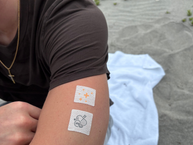Vitamin C is an essential nutrient, the lack of which was first tied to a specific health condition. Despite its importance, an alarming 6% of Americans aged six and above don't get enough of it, causing deficiency issues, according to the Centers for Disease Control and Prevention (CDC). Let's delve deeper into the implications of Vitamin C deficiency, its telltale signs, and how to use Vitamin C-rich foods and PatchAid's Vitamin C Plus Patch to improve your Vitamin C intake. But remember, always consult a healthcare provider before opting for new dietary supplements.
The Journey of Discovering Vitamin C Deficiency
Evidence of scurvy dates as far back as the 1500s when British sailors developed symptoms weeks or months into their sea voyages. Upon realizing citrus fruits could prevent the disease, sailors were advised to consume limes. This eventually led to the discovery and isolation of Vitamin C, confirming its critical role in preventing scurvy.
Identifying a Vitamin C Deficient State
While our understanding of Vitamin C has broadened, many of us still fall short of consuming enough. High-risk groups include smokers, those with restricted diets, and those whose meals lack substantial unprocessed fruits and vegetables.
Here are ten potential indicators that might signal a Vitamin C deficiency:
Delayed Wound Healing: A key part of the body's healing process, Vitamin C aids in collagen production, a protein vital for the skin, blood vessels, and bones. Inadequate Vitamin C may slow wound healing due to impaired collagen production.
Joint Pain: Collagen also cushions your joints, and a deficiency can trigger pain in areas like the knees or fingers. Vitamin C also has anti-inflammatory properties, so a lack could lead to joint swelling.
Frequent Infections: Vitamin C bolsters your immune system, and cells combating infections often contain this vital nutrient. Lower levels could increase your susceptibility to catching infections.
Deteriorating Bone Health: Beyond minerals, bones require collagen for structure and strength. Consequently, insufficient Vitamin C can promote bone fractures and conditions like osteoporosis.
Loose teeth/Bleeding Gums: Collagen is also present in the mouth. When Vitamin C levels drop, gums can weaken and teeth might loosen or fall out. Bleeding gums may also signal unhealthy blood vessels due to Vitamin C deficiency.
Iron-deficiency Anemia: Certain forms of iron need Vitamin C for absorption. If you're consuming an iron-rich diet but have anemia, you might be lacking Vitamin C.
Easy Bruising: If you're bruising easily, it may be due to blood vessels struggling to heal due to deficient Vitamin C.
Changes in Hair, Skin, or Nails: Low levels of Vitamin C could cause a change in your hair's appearance, give your skin a rough texture, or create spoon-shaped nails.
Rising Inflammation or Weight Gain: Acting as an antioxidant and anti-inflammatory nutrient, insufficient Vitamin C could elevate your risk of heart disease and weight gain.
Mood Drops: Tiredness due to Vitamin C deficiency could impact your mood negatively.
The Additional Support of the PatchAid Vitamin C Plus Patch
Boosting Vitamin C can be as simple as eating more fresh fruits and vegetables. Foods rich in Vitamin C include strawberries, oranges, tomatoes, pineapple, onions, potatoes, spinach, broccoli, and bell peppers.
For those requiring additional supplementation, the Vitamin C Plus Patch by PatchAid can serve as an effective aide by delivering 2500mg of Vitamin C, more than 10x of what a bell pepper provides. Plus, its absorption is efficient as it bypasses the digestive system, entering the body directly through the skin.
Supported by plant-based compounds like acerola, rutin, barley grass powder, and a citrus bioflavonoid complex, the Vitamin C Plus Patch can be an excellent way to maintain optimal Vitamin C levels.
Lastly, always consult your healthcare provider if you're concerned about a potential Vitamin C deficiency or considering using a Vitamin C Plus Patch.
Remember, these statements have not been evaluated by the Food and Drug Administration. PatchAid patches are not meant to diagnose, treat, cure, or prevent any disease.







